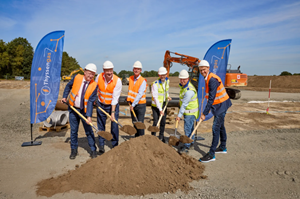News
Thyssengas begins construction of cross-border H2 pipeline between the Netherlands and Germany
The conversion of one of the first cross-border H2 pipelines between Vlieghuis in the Netherlands and Ochtrup in Münsterland is starting in Hoogstede. Thyssengas is celebrating the groundbreaking ceremony with representatives from politics, municipalities, and business.
Germany aims to become climate-neutral by 2045. Thyssengas is clear: H2 and other green gases are key technologies on this path. In October 2024, the Federal Network Agency approved the H2 core network, officially launching the construction of a Germany-wide H2 infrastructure.
After intensive planning, one of the pioneering projects for the future of energy is now being realized: By 2027, the approximately 53-kilometer-long natural gas pipeline system from Vlieghuis to Ochtrup will be converted to H2 transport. The pipeline project will connect the emerging Germany-wide H2 network to the province of Zeeland and the important import ports of Amsterdam, Eemshaven, and Rotterdam.
"The Germany-wide H2 transport infrastructure is coming, and as a long-distance pipeline operator, we at Thyssengas bear a key responsibility to help develop it," emphasized Dr. Thomas Becker, Chief Commercial Officer of Thyssengas. "In the long term, we will bring H2 to where it is needed – to industry, power plants, and distribution network operators. And not just to customers directly on the core network, but also in the adjacent regions."
Ensuring safety plays a crucial role in this process. At the groundbreaking ceremony, participants learned about the multi-stage safety procedures and 24/7 monitoring that play a key role in the transition to H2-powered operations. Environmental protection and nature conservation are also of paramount importance. Participants were able to gain initial impressions of the construction site during a joint tour.
In a welcoming speech at the groundbreaking ceremony, Bundestag member Albert Stegemann emphasized, "I am very pleased that here in Hoogstede, we are not just talking about the distant goals of the energy transition but are also putting them into practice. Connecting to the H2 core network opens up great opportunities for our entire region: We have an optimal geographical location, the local infrastructure, and companies that can benefit from it. The energetic commitment of our local construction companies is already generating initial added value – that's fantastic."


